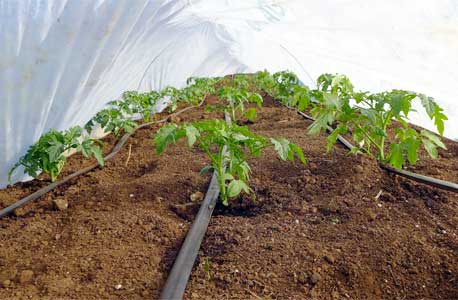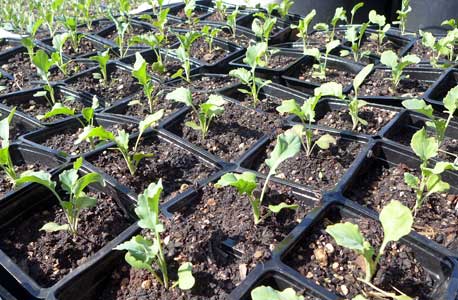Redwood Seeds planting guide


Download a FREE printable Seed Starting guide from My Rolling Hills Farm here!
TOMATOES, PEPPERS, EGGPLANT
Start these 4-6 weeks before the last frost date indoors or in a greenhouse. This family of plants need soil temps of 60-85 F to germinate. They will really pop out of the ground around 75-80 F. If your home is not that warm consider using a heat mat with thermostat. This provides bottom heat which improves germination. Cover small seeds by about 1/8-1/4 inch and keep moist. We use potting soil for our starts. Depending on how big your initial container is you may need to pot them up before putting into garden beds.
PEAS
Plant in fall or spring. These can be started in trays or directly sowed in the ground. Cover by 1/2 inch. They will germinate in soil temps of 40-75 F. Peas planted in the fall and overwintered will have a head start on pea production. Peas are light frost tolerant but hard frosts will kill them.
BEANS
Plant beans directly in the garden once danger of frost has passed. They tolerate a soil range of 60-95 F and will generally germinate in 4-8 days. Plant them twice as deep as they are thick. If the soil is too cool, bean seeds can rot in the ground. Also, birds love sprouting beans. If you have this problem you may want to start them in trays two weeks before planting or cover with row cover as they germinate
LETTUCE
To germinate lettuce in a greenhouse use six packs or 100 cell trays. Fill with soil mix and plant 1-3 seeds per cell. Water in and cover lightly with soil mix, about 1/8 inch. Seeds should germinate in 5-14 days depending on temps. Transplant when good root growth has occurred. Transplant in a 6 inch triangle pattern to get large heads. To germinate in the field, prepare the seed bed and plant in rows made with the fingers or sprinkle plant. Cover seeds in rows lightly or gently rake in sprinkled seed. Keep seed bed evenly moist. You will harvest a lot of baby greens using this method and will need to thin for large heads.
GREENS and BRASSICAS
Most brassicas will germinate very easily in the field or greenhouse. To start in trays cover by 1/8 inch. Brassicas germinate well in cool fall and spring weather, 40-80 F. Transplant when seedlings have their first true leaves. To start in field draw shallow trench, 1⁄2 inch, with the blade of hand or a stick. Sprinkle seed in trench and lightly cover by no more than 1⁄4 inch. Keep seedbed moist and protected from birds! For large plants like kale, broccoli, etc you will need to thin to achieve at least an eight inch spacing.
CUCURBITS: Squash, Cucumbers, Melons
These instructions apply to all squash, cucumbers and melons. In most climates these crops can be direct seeded in the garden after all danger of frost has passed and the soil has warmed to 70-90 F. Plant seeds 1/4 to 1/2 inch deep depending on size. The larger the seed, the deeper you want to plant. We plant our seeds in three foot wide beds. If you want to get a jump on the season or your season is short, start these seeds in the green- house. Beware, the grow quickly and you only need to start them 2 weeks before the last frost. Cucumbers can be spaced 5-6 inches apart. Melons 8-12 inches and squash 15-24 inches. Allow winter squash to stay on vines as long as possible then store in a cool dry location for winter eating.
HERBS:
Medicinal Herbs: Many medicinal herbs have very small seed. We fill trays with a good potting soil and sprinkle the seed on the soil. For very small seed such as nettle, do not cover, just water in. The seed will settle and be covered with the watering. Keep trays moist and be patient. Some herb seed can take up to 3 weeks or longer to germinate. Allow small seedling to grow then prick out the best plants and transplant into 4 inch pots. When they have reached a good size move to their permanent garden location.
Culinary Herbs: Cilantro loves cool weather. Start in fall and allow to grow all winter and spring. It will go to seed in hot weather. Save seed to replant. Dill and parsley are biennials that will overwinter in many climates. Direct sow or start in trays. Basil is a warm season annual. Direct sow in the field or transplant.
CORN:
Be sure soil is about 80 F before planting corn seed. Corn seed is very prone to rotting in the ground if soil temps are too low or a rain storm comes through with cool weather. Sow seed about 3⁄4 inch deep. Final spacing should be about 1 ft apart. Allow flour corn to dry on plant and harvest sweet corn when it is ripe. For sweet corn, plant in succession to have a steady supply of corn. Corn will cross pollinate easily so if you wish to save pure seed you will need to separate from other varieties by at least 1⁄4 mile.
GRAINS:
Quinoa and Amaranth do best when started in trays and transplanted to proper spacing of 8 inches to 1 ft. Start 2-3 weeks before last frost date and transplant to field. Sesame does well direct seeded when soil is above 80 F. Sorghum is very hardy and can be direct seeded as well.


